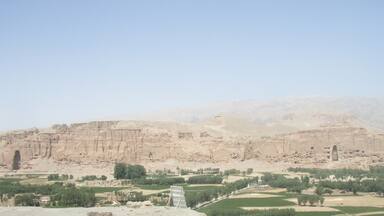Expert Working Group releases recommendations for Bamiyan Valley, Afghanistan
Expert Working Group meeting held in Tokyo, releases recommendations for Safeguarding World Heritage property of the Bamiyan Valley, Afghanistan
Following their meeting in UNESCO Headquarters in March 2011, a group of Afghan and international experts working on the safeguarding of Bamiyan (Afghanistan), as well as representatives of the Afghan and Japanese governments and UNESCO, have released a list of recommendations for further activities to preserve the Bamiyan site. The 10th Expert Working Group Meeting for the safeguarding of the cultural landscape and archaeological remains of the Bamiyan Valley World Heritage property was successfully held in Tokyo, Japan from 6 to 8 December 2011, in close collaboration with the National Research Institute for Cultural Properties, Tokyo, and the Afghan authorities.
Building on the previous meetings, officials from the Afghan Government, national and international experts formulated a list of recommendations regarding the future activities for the preservation of the Bamiyan site. They addressed various areas, including archaeology, management and cultural master plan, capacity-building as well as the conservation and interpretation of the Buddha niches and fragments.
The Expert Working Group was formed in 2002 to coordinate all cultural projects in the country entrusted to UNESCO by the Afghan government. This latest meeting aimed to clarify a programme of safeguarding to be implemented in the future Japan Funds-in-Trust Bamiyan Phase IV project, 1,5 million US dollars for the period of early 2012 to mid 2014, and to advise UNESCO and the Afghan authorities on issues related to the conservation of the Bamiyan World Heritage property.
The discussion emphasized the central importance of a cultural development approach in Bamiyan that incorporates and demonstrates the contribution of culture to sustainable livelihoods, education and the promotion of peace in Afghanistan. The meeting also served as a vector for the coordination of international efforts and as a discussion concerning a range of issues that included infrastructure and development plans of the Afghan Government for Bamiyan in the short and long term and the broader spectrum of heritage management challenges facing Bamiyan and its population.
The Bamiyan Expert Working Group also recognised that the current initiatives for the conservation and sustainable management of the World Heritage property of Bamiyan are fully in line with the UNDAF (United Nations Assistance Development Framework) and the Afghan National Development Strategy. The participants considered that the conservation of this outstanding heritage site contributes to promoting peace and fostering sustainable development, for the people of Bamiyan in particular, and in Afghanistan as a whole, by demonstrating the possibility of building sustainable communities by fostering cultural diversity and an appropriate use of the natural and cultural environment.













